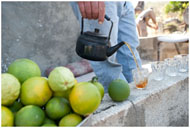
As a foreigner in Palestine who’s taking Arabic lessons, I try to use the tiny bits and pieces of Arabic phrases I know to communicate with vendors in the market. I try to say “wahad kilo” (one kilo) and ask how much it is in Arabic while supplementing it with hand gestures. What’s funny though is that just when I utter some words, most vendors either call a person who speaks English or reply in English. I wonder if it’s because they sense I’m trying too hard or my Arabic (accent) is that bad!
As most conversations go, they then ask me where I am from. I tell them that I am from Ethiopia; they smile and say “welcome, you’re welcome in Palestine”. They offer me tea or coffee and tell me the one or two Amharic words they know or Ethiopians they have met. Most people in Jerusalem especially remember Emperor Haile Selassie who stayed in Jerusalem for some time. Others mention the Muslim community that took refuge in Ethiopia in 7th C.A.D, escaping persecution in Arabia. For others however, what they know of is the Ethiopian Israelis in the army. Once I explain that I am Ethiopian from Ethiopia and not from Israel, they smile again and say “ahlan wa sahlan – you are welcome in Palestine”- words that make me feel truly and warmly welcomed every time I hear them.
Every country boasts of its hospitality. Mine does too. Ask any Ethiopian what Ethiopia is known for and they will tell you “hospitality”. “Ethiopian hospitality” is synonymous with freshly roasted, ground and brewed coffee, from the very birthplace of coffee” they will tell you. But hospitality in Palestine is different.
In Palestine, not only the individuals you know, but every Palestinian you encounter takes it upon her/himself to welcome you to Palestine. What made this very touchingly clear was an encounter last week. It was Saturday, the second day after the holy month of Ramadan was being observed and I joined an activist group who went to a village in south Hebron. The group I went with was a mostly Israeli - international activists’ group that accompanies shepherds in the village as they graze their herds. Since these shepherds face attacks from settlers and soldiers frequently, the purpose of the trip was to document and confront the settlers or soldiers if they try to harass the shepherds.
Anyhow, we indeed had our confrontations and arguments with the settlers as well as the Israeli soldiers that followed them. A lot of legalistic arguments as to whose land this was and who had the right to do what and who had the obligation to protect whom, what the job of the soldiers was etc. etc. were thrown around. Finally, the shepherds were tired both from the scorching July sun and from repeating this cycle of confrontation every day. Hence, they decided to take their sheep and go home; so we also decided to do the same.
As we were heading back from the hills to where our mini-van was, these shepherds we had met offered to take us home for some tea and coffee. Mind you, it’s the Ramadan fasting season and all of them were fasting. They would offer us water, coffee and bread even though the last meal they had was at dawn that morning and would not have any food or water until dusk that evening. In Ramadan, even people who don’t fast don’t eat in public or in front of people who fast. But out of true hospitality, they extended their “‘Mitzvah’ – their act of kindness” to us, as one of the Israeli activists put it.
So this is what I mean when I sway Palestinian hospitality is different. No treason to Ethiopian hospitality but four weeks living in Palestine and I still smile at every “ahlan wa sahlan - you’re welcome in Palestine” I get and every cup of na’na (mint) tea or cardamom coffee I’m offered.
Melkam Lidet is a Writer for the Media and Information Department at the Palestinian Initiative for the Promotion of Global Dialogue and Democracy (MIFTAH). She can be contacted at mid@miftah.org.
The world will pay for our genocide
Date posted: July 13, 2024
By Joharah Baker
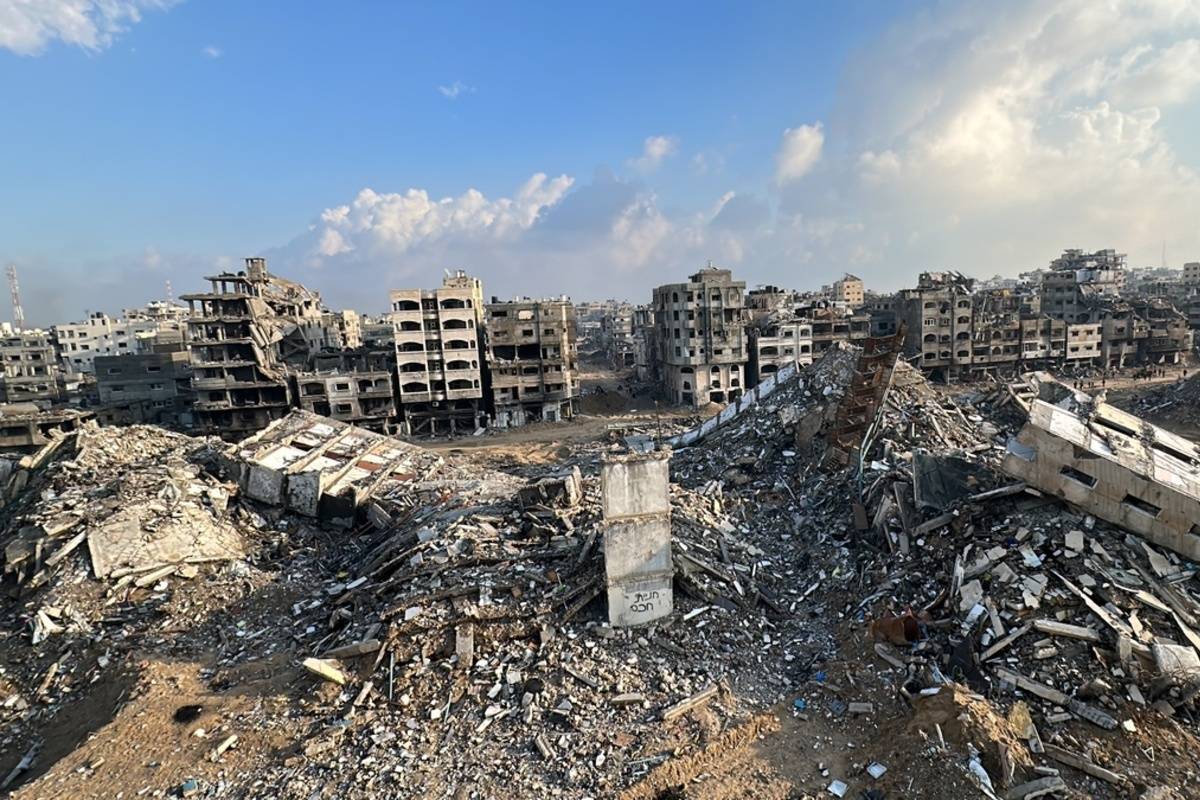
On a recent advocacy trip to Europe, I was asked by a young university student how to respond to his parents who shrug off the genocide in Gaza as something that is “unfortunately inevitable”. While this student maintained that his parents realized this was not an ideal situation, he admitted to struggling with their nonchalant attitude about the annihilation of the Palestinians. My answer was brief and to the point, albeit emotional. “Tell them: is this the kind of world you want to live in? Where a state can freely annihilate an entire people with impunity? Is this the world you want your children and grandchildren to inherit?”
The young man was well intentioned and he was clearly grappling with this existential conundrum. Jewish, he grew up in a household that believed in Israel and the Zionist project, but having witnessed what this entity and its ideology is capable of, he shifted course and is now trying to convince his parents it is their moral imperative to do the same.
Now over two months after this encounter, as Palestinians and many around the world continue to reel from the horrific scenes coming out of Gaza, this young man’s question has repeatedly crept back into my head.
In the past nine months, Israel has provided a sneak-peak into the world it envisions: one that does not question it, regardless of its atrocities; one where the word Palestine, along with its people, are wiped from map and memory. The Gaza slaughter is a foreshadowing of this new world order, which does not include us.
As the genocide grinds on mercilessly, the dead, wounded, missing and displaced soaring to unimaginable heights, a terrifying truth has dawned on us Palestinians: there is no question anymore whether the world will allow our extermination to happen or not. The answer is provided every day and with every unchecked massacre.
This world that really is callous, watching the slaughter of innocent men, women and children without blinking an eye. Or worse, they justify the rivers of Palestinian blood as “concerning” but immediately follow this up with the hackneyed phrase: “Israel has the right to defend itself,” or, “…but Hamas.” Where is the argument for the Palestinians’ right to self-defense against a brutal military occupation that has stripped them of rights and dignity for decades? Does that never calculate into the equation? Apparently not.
This is nothing new. Colonialist powers have always maligned the people under their colonization, dehumanizing them through language and deed as a means of justifying their annihilation. Indigenous peoples all over the world understand this painful reality, from New Zealand, to North and South America, to Africa and of course, Palestine. We are the “terrorists”, and the “human animals”, so our deaths will not matter.
This is where the world has it all wrong. To the parents of this young man who found his own humanity and compassion for the plight of Palestinians and was desperately seeking answers to how this compassion could be passed on to his parents, the answer is clear. The world will pay for this genocide in more ways than one, humanity being the first casualty. If “never again” signifies anything other than its literal meaning, then it means nothing at all, and this is a dangerous and slippery slope for everyone. If Israel is allowed to get away with mass murder and remain a nation among nations, who will stop Israel or others from doing this to another people ? Those who greenlighted this genocide from day one, unwittingly created a beast that will turn on them the first chance it gets.
The people united will never be divided
Date posted: April 30, 2024
By Joharah Baker
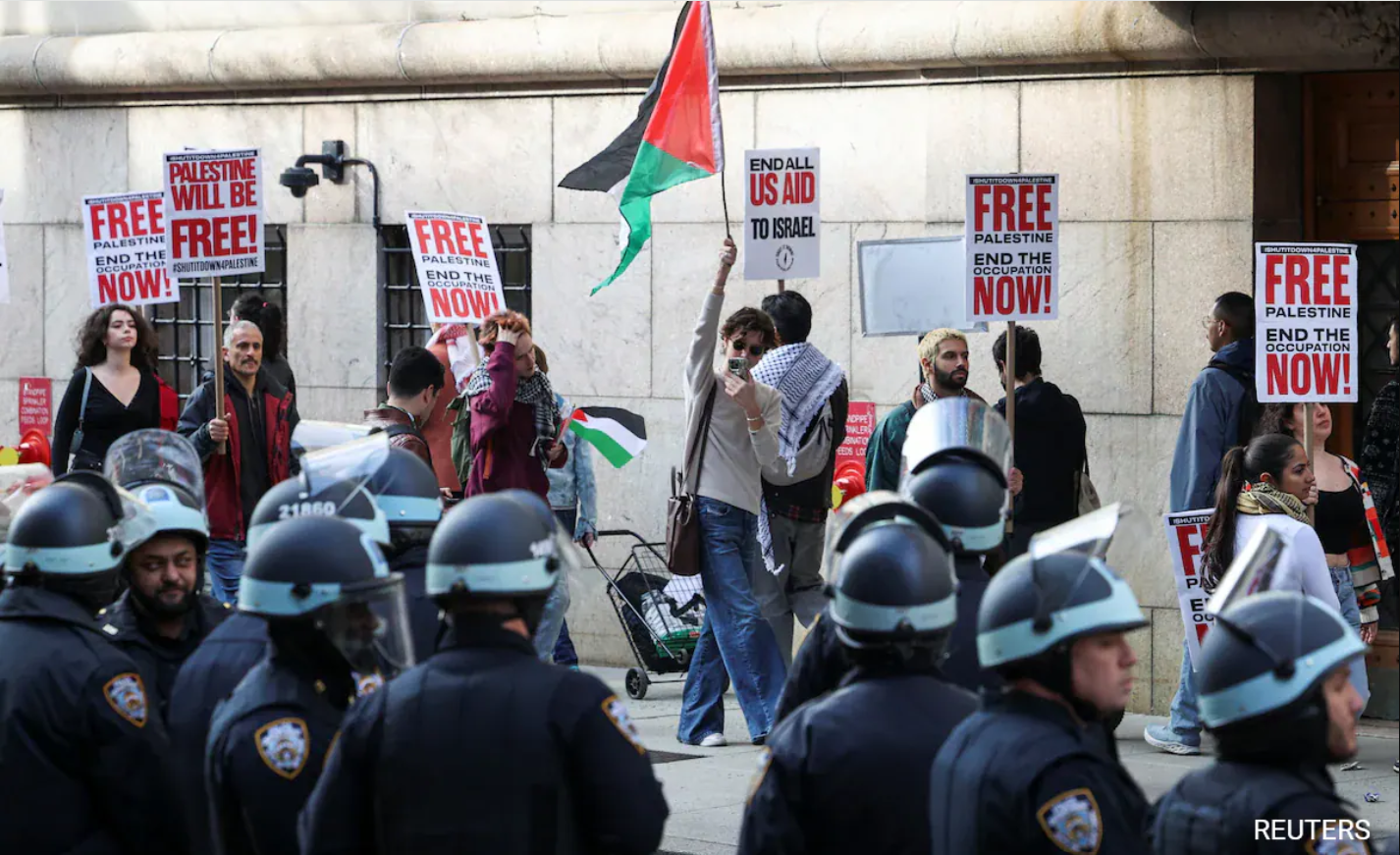
I was born in the United States and lived there through early childhood, but since returning with my family to Palestine, I have never wanted to go back. The United States has always evoked mixed feelings in me. I have a certain nostalgia for the place of my birth but my overall sentiments always culminated in a sense of resentment for this so-called superpower that has systematically aided in my people’s oppression, occupation and dehumanization.
That is, until present day. The scenes of American university campuses breaming with students in kuffiyehs, waving Palestinian flags and resisting the brutality of the police and their own university administrations, has uplifted my spirit in ways I cannot fully articulate. In a word, what is happening on US campuses today is validation of our people, of Palestine and of our struggle. To those who live comfortable lives in free countries, this may sound like an exaggeration, but for my people, who have been denied their very right to exist, who have been demoralized, demonized and dehumanized, this is huge. We are seeing students of all races, creeds, backgrounds and religions, calling for an end to the genocide in the Gaza Strip and marching for a free Palestine and divestment from the Israeli occupation. We are hearing Jewish voices, debunking Zionist propaganda and its below-the-belt attempts to conflate anti-Zionism with anti-Semitism. We are being validated for our struggle, for our resistance against oppression, occupation and settler-colonialism and we are finally being heard and seen.
Students have always been the litmus test for social and political justice. Rallies and demonstrations on university campuses have been the driving force against imperialist wars throughout the ages, the Vietnam War being the best example. However, what is so incredible about this movement is that American students are not directly involved in Palestine. Students are not being drafted into an army to fight on foreign soil, so the stakes are not as high for them at the personal level. What is happening today is the direct result of the intersectionality of struggles and the belief that no one is free until all of us are free. This is a force far more powerful than a genocidal regime will ever be.
The scenes from university campuses in the United States and now in Europe, juxtaposed against the crushing images from the Gaza Strip, are a balm for our wounded hearts. We feel a kinship with these incredible Gen Zs who have put their very lives on the line for Palestine. We send them love, energy and solidarity as we watch them being thrown to the ground, handcuffed and arrested and we burst with pride as we hear them chant ‘Free Palestine”.
This is a moment in time that must not be squandered. May these American university protests spread like wildfire throughout campuses across the world, putting to shame both Zionism and American imperialism, which has allowed this racist ideology to survive. The Palestinians have never wavered in their determination to liberate their land from Israeli occupation and oppression, whether they do it alone or with the help of friends. Today, thanks to the beautiful people all over the world who have championed our cause alongside of us, a free Palestine is not only an inevitability, it is just around the corner.
Who will hear their screams?
Date posted: April 01, 2024
By Joharah Baker for MIFTAH
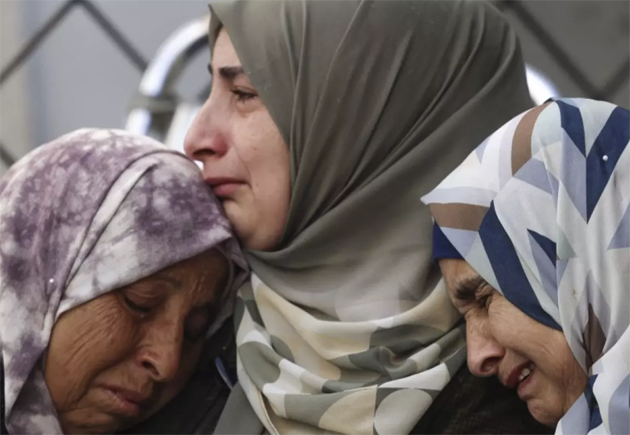
When Israel claimed women were sexually assaulted on a mass scale on October 7, the world exploded. Almost the entirety of Israel’s genocidal war was based on these and other allegations, many unsubstantiated. We all remember the infamous’40 beheaded babies” story, do we not?
This article is not about Israeli allegations per se, neither will it only focus on violations against Palestinian women. This is about a world that is immediately up in arms when one side merely alleges atrocities while it turns a blind eye to actual documented violations against the “other”.
In Gaza, it is painfully clear that we indeed, are ‘the other’. How else can anyone explain the muted cries of women being stripped, raped, starved and murdered practically in real time, on our phone screens, documented in UN reports and described in horrific detail in eyewitness testimonies? There is no other explanation than that Palestinians are what Arundhati Roy calls “Children of a lesser God”. We are the victims of deep-rooted colonialism, one whose geographic demarcations may have vanished but whose insidious, dehumanizing mentality still prevails and manifests in the ugliest of manners.
For nearly six months, Palestinians have endured unspeakable atrocities at the hands of Israel’s occupying army. Today, the Gaza Strip has been reduced to an emaciated shell of what it once was. As Gaza is being systematically decimated and ethnically cleansed, the world, for the most part, looks on. Barring sympathetic supporters and a few well-intended but timid political actors, nothing has been done to stop the carnage. Palestinians once believed there was no way the world would allow Israel to erase Gaza off the map, no way it could see a live-streamed genocide and do nothing. But that is exactly what is happening.
Then, when we thought things could not get any worse, something unfathomable emerged from the deathtrap of Gaza. When this happened, we were certain it would be the turning point in this hellish nightmare. Well-documented reports, corroborated by the UN and eyewitnesses on the ground, told of harrowing stories of sexual assault against Palestinian women in Gaza.
We were paralysed with horror when we heard of women being raped by Israeli soldiers in northern Gaza, assaulted and stripped in front of their families. What’s worse, we all know that in times like these, the undocumented atrocities will far outnumber those documented. Who knows what horrors will unfold once the dust settles in Gaza; no doubt they will be so horrific, our entire nation will be traumatized for years to come.
The real question here is not how Israel’s soldiers perpetrated such gross violations. I think by now we can all agree that this depraved military establishment and its political echelon to boot, has dehumanized and vilified Palestinians so much and for so long, they will justify just about anything. No, the question is more about the moral compass of the rest of the world. While alliances and political interests are always part of the equation, even when the issue pertains to basic human rights, nothing can better explain the blatant hypocrisy, double standards and loss of collective humanity than the deafening silence today.
Our women have not only been killed, starved and displaced, they have been exposed to the very violations that sparked global outrage and a genocidal war against an entire population under occupation, unprecedented in modern history. This is not only unacceptable, it is an indelible stain on humanity. Sexual violence is a crime so heinous it is imperative to condemn and prevent, no matter the perpetrator or the victim. That must always be the baseline in any argument.
Palestinians will never get past this genocide; it is not something you can come back from. However, be assured, this is not only about the Palestinians. The world’s women, the majority of so-called feminists who have remained disgustingly silent, must know this: when you do not stand up for women, all women, no one will stand up for you in your time of need.
On ''punishment''
Date posted: December 19, 2012
By Melkam Lidet for MIFTAH
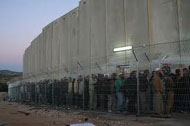
Ever since the Palestinian status upgrade to a non-member observer in the UN, Israel has threatened to “punish” Palestinians for what it said was a “unilateral step” that impedes peace. As part of this “punishment” Israel is now going to build 3,000 settlement units in E1 - a Palestinian territory in the West Bank that would connect the settlement of Ma’ale Aduminm with Jerusalem while bisecting the West Bank. If it goes ahead with this plan, the north and south of the West Bank will be cut off from each other and with Jerusalem. The Israeli government has also withheld tax money worth $120 million it collected on behalf of the PA for the month of November and said it is using it to pay the PA’s debt to the Israeli electric company.
This is not the first time Israel has threatened to “punish” Palestinians for seeking international diplomatic redress and solutions amidst halted peace talks with Israel. Last year, it did the same when Palestine got full membership at UNESCO, and in 2006, when it refused to forward tax money after legislative elections in which Hamas won the majority of seats; this “punishment” game is a stale old game Israel likes to play. Yet it still surprises me how Israel publically announces that it will “punish” Palestinians. It might be just me but the word “punish” denotes either a paternalistic or a patronizing relationship; if neither, then it at least denotes a hierarchical one. Further, and especially when publically used without shame, “punishment” implies that this asymmetric relationship is one where not only mere capacity and power but also the right to use this power i.e authority, is given to one side over another. This is what I find problematic in the case of Israel: what gives it the authority to “punish” Palestinians?
Indeed, Israel has the military, diplomatic and economic upper hand both because it is an internationally recognized state and because it’s an ally to the sole global superpower, the United States of America. This is an undeniable fact but, the way I see it, it’s only a fact that gives Israel the mere capacity or power but not legitimacy or authority to “punish” anyone, much less the Palestinians. Power doesn’t always entail authority; neither does it come with the right to use that power. This is a point Israel continues to miss.
This is not about the linguistic appropriateness of the word “punishment” but about the meaning the word entails and the message it carries when looking at the Israeli-Palestinian relationship. In other senses of the word, when parents “punish” their children, it’s because they are the primary caretakers of their children; they take responsibility for the child’s needs and also its actions until it becomes an adult. It’s because parents, as grownups, are more experienced and rational than their children who they punish. This is what gives parents the legitimate authority to punish their children not just their mere ability to. The same goes with relationships between people and animals; or between God and people, if you’re religious. All these examples show that punishment is only possible in asymmetrical relationships that are based on authority rather than capacity or power.
While these are examples of natural relationships, there are also socially-constructed systems that follow suit. Case in point is the relationship between people and their respective “laws”. Most societies wrote the laws they want to uphold as a society and agreed that every member of the society is below this law. They constructed the hierarchy in which the law would have a higher hand above the people. As a result, when someone is found to have violated the law, it is investigated and the person “punished” accordingly.
In the case of Israel and Palestine though, the power asymmetry exists based on constructed measures such as military, economic, and diplomatic power. But it doesn’t exist on natural moral grounds in a way that Israel has more authority over Palestine. At the end of the day, Palestinians and Israelis as individuals have the same value and so should the ‘states’ that these two people form.
Of course the fact that Israel is the occupier and Palestine the occupied naturally puts the two in an asymmetrical relationship. But it’s an asymmetry that is not justified in any way (natural or constructed); it in no way bestows authority on Israel to “punish” Palestinians. Israel’s military might doesn’t give justification to its occupation of Palestine. Neither does its membership at the UN nor its close ties with global powerhouses afford it authority to “punish” the Palestinians. If we have to talk about “punishing” then the punishment of both sides should come from a higher entity. Only legitimate international bodies such as the International Court of Justice, the ICC or even the UN (though it is not a judicial body) have the recognized right to “punish”. Israel does not represent the people it wants to “punish”; nor does it provide or take responsibility for them; nor does it have the natural or constructed higher ground to “punish”. It just does so because it can. And this is called arrogance not “punishment”.
So the next time Israel announces that it is going to “punish” Palestinians for this and that – please let’s take a moment to be reminded that it does not have the authority to “punish”. We should call a stick a stick, and clearly state that what Israel is committing is blatant oppression with impunity.
Dear Palestine:
Date posted: December 12, 2012
By Melkam Lidet for MIFTAH
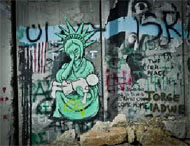
Dear Palestine: before I pack up my things and leave, I want to say a few things. I want to say thank you for your generosity, for the numerous cups of tea with mint and coffee with cardamom. These two things shall always remind me of you. Thank you also for the multiple lunches, dinners, and weddings I was invited to. The food was always delicious, the hospitality humbling and the conversation warm. I would also like to thank you, dear Palestine, for thanking me, even when I was the student and you my teacher; when I was the guest and you my host. I won’t forget the faces of gratitude the people in faraway villages and country sides showed visitors like myself. In these places where the harsh reality of your life under occupation is prominent, the people were always eager to share their stories in hopes that they would be echoed louder around the world. Even though they receive curious visitors every now and then, they didn’t seem to be fed-up. Rather, they were always warm and hopeful even when they told the same stories to different groups at different times. Their hope and hospitality were always intact even when the reality is that we came and left and not much changed in their lives.
Dear Palestine, I’m sure you’ve heard this before but I still feel compelled to say: you are beautiful. Your hills and valleys, green fields and deserts, summer and winter, are all beautiful. You Palestine are a land of contrasts not only in your topography and climate but also in the rest of your being. Contrasts, contradictions, ironies and paradoxes are things I will remember about you. I will remember how people lived in this land way before states existed and how states now question the statehood of your people, as they deemed you a “land without a people”.
I know history can’t be changed; but the reason why the present and the future cannot either, baffles me. The Nakba cannot be undone I know, you also know, but I don’t understand why its features should be continuously perpetrated now, in the 21st century, 64 years later. Why houses are demolished, farmlands confiscated, villages “unrecognized” now, in the present will be something I’ll continue to struggle to understand. I just hope that a time will come where we’ll all stop and realize what has happened, acknowledge how we have failed, reconcile the past and the present, find healing in forgiveness and justice and live in peace.
Puzzling is also how you are forced to live with your situation yet you have to appeal to your oppressors and those that signed you off for your basic dignity. You plead to the “international community” to hold your occupier accountable, to name-shame, castigate and even punish. When it fails as it often does, you call on the help of human rights organizations and global citizens in solidarity to prevent some of the pain that torments you on a daily basis. Sometimes, those who come to your help, be it for accompaniment, olive harvesting, protesting, documenting violations, advocating on your behalf are “good-willed” citizens of your oppressor and its accomplice. This is probably the third thing that strikes me – how you are forced appeal even to those who may belong to your occupier and its allies to win your freedom; how they’ll come to do “cultural exchange”, give “development assistance”, show “good will gestures” etc. to assuage but not to heal.
Also interesting was the realization that not only are you chained powerless but that you also have to polish and ‘oil the wheels’ of the chain that holds you captive, in order to afford yourself the slightest of movements. The wall around you and the settlements inside you are all the designs of your occupier but mostly the work of your own hands. It hurts me to see your people forced to make these decisions all the time: put food on the table by working in settlements or boycott working for the oppressor and go home empty-handed.
Dear Palestine, please know that this is not coming from a place of pity, but rather empathy. It’s coming from a person whose faith in humanity has been both shattered and reconstructed time and again throughout her stay. Shattered because I no longer know which is the stronger force, humanity’s potential for good or evil. Disappointed because I was wrong in assuming there’s always a reason (one I may or may not agree with) behind every action. Apparently pure hatred, selfishness, racism and arrogance directed at your people can serve as blatant motives. Even more disappointing and appalling is how this has been tolerated by the ‘international community”. Oh, one more thing: there’s no “community” in the “international community”; it’s all politics and lip service.
But no, pessimism is not my take-home message from you Palestine. Rather, it’s resilience. Your people have shown me what it means to live beyond and above occupation: to laugh, live and love life and embrace everything that comes, and rise above it. They endure, resist, persist and live again, just like an olive tree. They rebuild, replant, and regenerate everything that is demolished, uprooted, killed and destroyed. They do not give up, neither do they give in; but they live and they do so rising above their Nakba. That is my take-home message: to live is to rise up above life’s obstacles, to persist and to resist but (and this is important) without forgetting to enjoy life as it is and without hesitating to make the best out of it. And I am indebted to you for this lesson. Perhaps the next time I come things will have changed for the better – inshallah. Long live Palestine.
Melkam Lidet is a Writer for the Media and Information Department at the Palestinian Initiative for the Promotion of Global Dialogue and Democracy (MIFTAH). She can be contacted at mid@miftah.org.
''Slowly but surely, an egg will start walking''
Date posted: November 28, 2012
By Melkam Lidet for MIFTAH
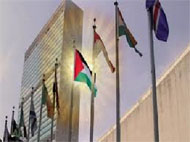
Last week, Palestinians were looking towards Gaza. The Israeli assault was turning buildings into piles of rubble and bodies of civilians, women and children included were being pulled out. The destruction may have been in Gaza but the pain and agony transcended beyond the border fence of Gaza into the West Bank. All Palestinians had the same thing on their mind: that troubled coastal strip on Palestine’s Mediterranean border to the west. Last week it was Gaza that occupied Palestinians’ minds regardless of ideological differences and geographical distances. Today once again, Palestinians all over are united as they set their eyes on New York in hopes that nations would respond to their yearning for freedom, justice and human dignity.
Exactly a week ago, on Wednesday evening, Hamas and Israel agreed to a ceasefire. Earlier that day when the news about a bus explosion in Tel Aviv came out, I did not think there would be an agreement between Hamas and Israel at all let alone that same day. I was worried that this would provide the pretext Israel was waiting for to declare the ground invasion for which it had beefed up its troops around Gaza. When I left Ramallah that Wednesday, all looked calm but I was worried that would be my last visit to the city. Suddenly, the unpredictability and fragility of this particular situation (for me) or life under occupation (for Palestinians) became more relevant and tangible.
Right after I read the news about the Tel Aviv explosion I was talking to a friend, asking him if he heard about the news and if he was worried or nervous. He said he wasn’t: “I’m not nervous; it’s our life, so it’s normal for us”. Before I got over the biting truth of what he said, he continued: “I was born in and spent my life in this situation. I think it would be strange for me if I went somewhere else”. Sadness and frustration started to take over me as I realized what he said was not pessimistic but rather realistic; I started to think about the children of Gaza and what they might have learned from all this insanity around them.
The situation is not much different in the West Bank. Children may not wake up to drones hovering over the skies, or have their daily calorie intake measured by Israel as is the case in Gaza, but they do know what it means to live under military occupation. They see their parents being harassed by 18-19 year old Israeli soldiers with guns; their older brothers get imprisoned without charge, their houses are raided in the middle of the night, they are harassed by violent settlers, they are tear-gassed for protesting and know that live bullets might the retaliation for stone-throwing.
When Palestinian children become grownups they are confronted with the harsh reality that they aren’t really the masters of their fate. Israel and the US or international politics decide much of it for them without their input. Not only are they confronted with this reality but they also have to make peace with it, in order to live a “normal”, sane life. They resist and persevere with all their might and will all the means available to them, but they do so with the understanding that at the end of the day “it’s all in the hands of Israel”. And this has to stop.
That is what the Palestinian bid for a status upgrade is aimed at bringing about; its reaffirmation that Palestinians as a nation have the right to self-determination, independence and the right to decide their own future. While discussing the significance of the UN bid with two Palestinian women, one of them said she doesn’t think it would change much. She said “it’s all in the hands of Israel; if Israel says stop the money, everyone will stop the money and how will we live?” The other one, who was nodding in agreement jumped in to add “and Obama….” she said pointing her forefinger, looking up, and then nodding in utter disappointment “Obama…. “ she repeated, sighed and shook her head again. All she could say about the shattered hopes she had for the US President was embedded in that nod and in her silence, as her words failed her. But the Palestinians’ determination to appeal to the UN against all odds is, as PLO Executive Committee member Dr. Ashrawi said, their assertion that “Palestinians can’t always be blackmailed; that some rights are just not up for sale”.
The Palestinian spirit over this bid may not be half of what it was last year when the full bid for statehood was submitted. But once again, the fate of a people – the Palestinian people – will be decided by others – by those who are far from the scene. And maybe this time, more nations will make their decision based on ideals of peace and justice rather than their political interests. Perhaps many will dare to make history instead of being on the wrong side it.
The status upgrade may not mean much for a people that has long awaited freedom, but favorable response from the General Assembly would afford Palestinians some channels to seek redress for the numerous injustices inflicted on them by the occupation. It may not end the occupation immediately but it would curtail the impunity with which this occupation operates. It is a positive stride forward and one that is needed to undo an occupation that has now reached its climax through gradual developments. As an Amharic saying goes “slowly but surely, an egg will start walking”.
Melkam Lidet is a Writer for the Media and Information Department at the Palestinian Initiative for the Promotion of Global Dialogue and Democracy (MIFTAH). She can be contacted at mid@miftah.org.
''Unrecognized''
Date posted: November 14, 2012
By Melkam Lidet for Miftah

Having lived in Palestine for a few months now, I was starting to feel like I was finally getting down the details of the occupation that I wasn’t able to grasp from my readings on the conflict. After all, I have Palestinian friends who can’t come visit me in Jerusalem because they don’t have permits; I cross the Qalandia checkpoint like thousands of Palestinians who have to do the same on a daily basis; I’ve visited the “ghost city” of Hebron, witnessed settler attacks on Palestinians and more. I really thought I understood the tangible ramifications of the Israeli occupation on the lives of Palestinians until last Sunday, when I visited the Jordan Valley. The depth of the occupation I saw there was far deeper than the denial of personal and political freedom. Rather, it was the denial of the mere existence of a people in a system designed to dehumanize and deny Palestinians basic human dignity.
The Jordan Valley is 30% of the West Bank and inhabited by around 55,000 Palestinians, 42% of whom depend on agriculture or animal husbandry for their livelihood. Most of the Palestinian Bedouins in the Valley are refugees from the 1948 war who fled their villages in the Negev Desert. While some came to the Jordan Valley during the Nakba, others were forcefully relocated to the Valley from other places in the West Bank after the 1967 war. It was not until the Oslo agreement though that 95% of the Valley was characterized as Area C i.e. under Israeli military control – and became virtually inaccessible to Palestinians. Though the Palestinian Bedouins have lived in the area, worked the land and grazed their animals for decades, Israel has claimed much of their land as “state land” and has been handing it out to Jewish agricultural settlers and closing it off as “firing zones”. As a result, thousands of the Palestinians Bedouins in the area live in “unrecognized villages”.
As a result, 98.3% of Palestinians there have lost their agricultural production capacity due to Israeli restrictions, costing the Palestinian economy around $1billion. 49% of the Palestinians do not have access to water and the Palestinian Bedouins spend around 40% of their household income on water. These are facts and figures of the Jordan Valley but behind these facts and figures are thousands of people for whom these numbers represent a daily reality.
The 1,000 people in the village of Ras al-Auja are the perfect example. The elders of the village told us that they are 1948 refugees from Lasayfer village in the Negev. Before being relocated to the Jordan Valley in 1969, they were living in South Hebron Hills as refugees. Today, Ras al-Auja is a small Bedouin community that lives on cattle herding in temporary, tent-like structures without access to water or electricity. The spring water they used to rely on is now channeled to the neighboring agricultural settlement of Yitav, leaving them almost no water from that source. They now have to travel a few kilometers away to buy 35 tanks of water per day, at a price of 80NIS/tank. Unlike the Yitav settlers nearby who only need to turn on a switch to get electricity, the people in Ras al-Auja depend on expensive gasoline to run their generator and can do so for only a few hours a day. They can’t build permanent structures and their village is under constant threat of demolition. Further, they don’t have health centers or schools and have to walk several kilometers to access such facilities. Israel won’t provide them with these basic services but neither will it allow the PA to do so.
One could pass off the scene in the Jordan Valley as sad and unfortunate if it were somewhere else in the world. After all, there are millions in the world who do not have access to water, land, and secure livelihoods or shelter. But this is more than sad; it is outrageous because it is not the lack of resources or capacity, but a blatant Israeli policy of segregation, racism and deprivation that’s behind the injustice in the Jordan Valley. Even more outrageous is the fact that Israel is not only turning a blind eye to the situation, it is the creator of this situation and is now actively perpetuating it.
Unable to cultivate their land and graze their cattle, the people in the Ras al-Auja village, sometimes find employment in the agricultural settlements around them. Just like Moses’ mother was employed to take care of her own child in the Pharaoh’s Palace, the Palestinians work on the lands that used to be theirs, water the plants from the spring they once drank from and package products labeled “Made in Israel” in place of “Made in Palestine”. For all their hard work, they get three times less than the minimum wage in Israel or what the Thai workers in the same agricultural fields are paid, while their settler employees make millions of dollars in revenue.
There is a perfect explanation for this. Apparently for Israel, the Palestinians in the Jordan Valley do not exist. When Israel writes people off as “unrecognized” and denies their mere existence, it’s more than infringing on their freedom. It is reducing them to something less than human. And that’s what occupation in the Jordan Valley means for thousands of Palestinians: infrahumanization by the “democratic” state of Israel.
Melkam Lidet is a Writer for the Media and Information Department at the Palestinian Initiative for the Promotion of Global Dialogue and Democracy (MIFTAH). She can be contacted at mid@miftah.org.
14 Emil Touma Street,
Al Massayef, Ramallah
Postalcode P6058131
P.O.Box 69647
Jerusalem
972-2-298 9490/1
972-2-298 9492
info@miftah.org




